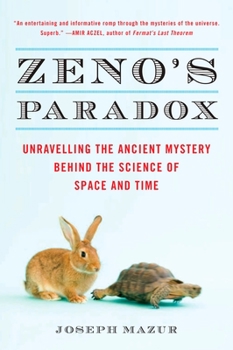Zeno's Paradox: Unraveling the Ancient Mystery Behind the Science of Space and Time
Select Format
Select Condition 
Book Overview
The fascinating story of an ancient riddle and what it reveals about the nature of time and space Three millennia ago, the Greek philosopher Zeno constructed a series of logical paradoxes to prove that motion is impossible. Today, these paradoxes remain on the cutting edge of our investigations into the fabric of space and time. Zeno's Paradox uses the motion paradox as a jumping-off point for an exploration of the twenty-five-hundred-year...
Format:Paperback
Language:English
ISBN:0452289173
ISBN13:9780452289178
Release Date:March 2008
Publisher:Plume Books
Length:272 Pages
Weight:3.83 lbs.
Dimensions:0.6" x 5.1" x 7.8"
Customer Reviews
2 ratings
Fascinating read
Published by Thriftbooks.com User , 14 years ago
This is another book written in the same engaging formula, seen before in Mazur's other books. Besides the scientific facts, there is always a human element, and bits of trivia about the people that made these amazing discoveries. A fascinating mix of facts and literature, math and philosophy that draws you into a joyfully thought-provoking read.
dialectic
Published by Thriftbooks.com User , 15 years ago
Fun to see this book. The subject is still alive. For someone not acquainted with Zeno's paradoxes, here is a book by a contemporary author supported by a contemporary publisher for a contemporary audience. But the subject is ancient, having been discussed by authors since Aristotle. An older literature is certainly available for those who would like to learn more of the details. Dialectic is the flow of peace from micro to macro in Plato's Republic: Book I I do have a critique. I would've preferred a healthier skepticism about Plato, especially where Plato uses second-hand sources about Parmenides, Zeno, and Socrates. Courts of law disregard hearsay and here I would apply the same rationale. For example, Aristotle said the "forms" were from Plato, not from Socrates. So when reading Socrates' story of the cave, because of Aristotle's warning I try to strip away what might be suspect as Plato's and instead look underneath for a basic story that Socrates might actually have told. The basic story of the cave seems to be that only through "dialectic" can you get out of the cave of darkness to see what you really are. Plato's writings also seem inaccurate about "dialectic." Whatever "dialectic" is, I know you are not going to get out of the cave of darkness to see what you really are by participating in dialectic with me. Based on what Aristotle said, I don't think you could've gotten out of the cave of darkness to see what you really are by dialectic with Plato, either. Only dialectic with Socrates could have guided you out of the cave of darkness to see what you really are. Given these problems of partial information and hearsay, taking full account of context may help an interested reader. Socrates and Parmenides were of different times. Socrates followed Parmenides. And although our other main source about Socrates-- Xenophon-- was neither poet nor author like Plato, neither Xenophon nor Plato was in that closest circle of friends (those most intent in their practice of Socrates' message) who called Socrates "Master." But today for our information about Socrates we mostly rely on the writings of Plato and Xenophon, Plato is preferred to Xenophon, and neither was as attuned to Socrates' message as those who called Socrates Master. By comparison, Zeno seems to have heeded the message of Parmenides more closely than Plato heeded the message of Socrates. Rather than after he died, writing down the history of this amazing person who had tried to help them (as did Plato and Xenophon), Zeno constructed his paradoxes in order to help Parmenides in Parmenides' own lifetime. So it is a possibility that Zeno heard some feedback from Parmenides about his paradoxes and applied it, while it was impossible for Plato and Xenophon to get that kind of feedback from Socrates, who had died. From this point of view, Parmenides' message is the basic context for reading about Zeno. Translating the Greek word "auto" into "self," Parmenides' most famous quote is "the




